
![]()
![]()
Introduction
1846
The sequel
Prague ancient and modern
Concert venues
This page is also available in French
![]()
It is public knowledge that the Bohemians are in general the best musicians in Europe and that a sincere love and keen feeling for music is widespread among them in all classes of society.
Berlioz, Memoirs, Travels to Germany II, Sixth Letter
For many years before he started on his European travels Berlioz’s thoughts were concentrated on Germany and it seemingly did not occur to him to visit Prague. Prague was not on the list of cities that Berlioz intended to visit at the start of his first trip to Germany in December 1842 (Correspondance Générale no. 791; hereafter CG for short), nor did it figure initially in his plans for the second trip of 1845-1846. In fact, according to the Memoirs (Travels to Germany II, 4th letter), while in Vienna in November and December 1845, Berlioz was initially warned off going to Prague at all:
I had already criss-crossed Germany before it occurred to me to visit Bohemia. When I finally conceived the idea in Vienna I had to put it aside prudently, following the advice of several persons who on the face of it were well informed. « Do not go to Prague », I was told, « it is a city of pedants, where only the works of the dead are held in honour; it is true that the Bohemians are excellent musicians, but musicians in the manner of professors and school-teachers; as far as they are concerned, anything new is detestable, and do not expect to have any reason to be pleased with them. »
I had therefore resigned myself to abstain and to give this trip a miss when I was brought a copy of the Prague Musical Gazette which had three long articles on my King Lear overture. I had them translated, and far from finding there the hostile attitude and pedantry that the Bohemians were accused of, I realised with joy that this critique possessed to the highest degree the opposite virtues. The author, Dr. Ambros, seemed to me to combine genuine expertise with sound judgement and brilliant imagination. I wrote to thank him and to put to him my worries on the attitude of his compatriots towards me. His answer destroyed them completely and fired me with a keenness to visit Prague equal to the fear I had previously experienced. In Vienna people did not spare me their jokes when they knew that I was determined to go. « The people of Prague claim to have discovered Mozart, they only swear by him and will listen to nothing but his symphonies, they will give you a rough ride, etc. » […]
The articles on the King Lear overture were prompted by a performance of the work given in 1845 at the Prague Conservatoire under J.-F. Kittl (1808-1868), the director of the Conservatoire, who was to be with Dr August Ambros (1816-1876) one of Berlioz’s main supporters in Prague. Berlioz’s writings do not provide the full context to his visit, but valuable contemporary evidence on the Prague musical scene comes from the recollections of the music critic Eduard Hanslick (1825-1904) who was active in Prague at the time (excerpts from his writings are to found in Michael Rose, Berlioz Remembered [2001], hereafter cited for short as Berlioz Remembered). Hanslick is better known for his later opposition to Wagner – as well as to Berlioz himself – but as a young man he and other like-minded music-lovers in Prague had enthusiastically embraced the cause of Berlioz and progressive music. According to Hanslick a decisive step in their campaign was the appointment of Kittl as director of the Conservatoire in 1843; Berlioz’s growing reputation in Germany and his concerts in Vienna fired them with the ambition to bring the celebrated Frenchman to Prague to perform his music (Berlioz Remembered, p. 151). Prague was ready for Berlioz even before he arrived there.
The composer’s preserved letters for the latter part of 1845 do not provide any insight into the preparations leading to the visit – for example, the letter to Ambros mentioned by Berlioz has not survived, though Berlioz evidently took steps to inform himself and prepare the ground. At any rate, Berlioz’s plans were public knowledge in Vienna by the beginning of 1846. On 6 January the journal Der Wanderer announced his movements for the coming weeks: ‘Hector Berlioz will soon be travelling next week to Prague, where preparations are already in hand for the performance of his compositions. From there he will travel to Pesth, and then return to Vienna to organise a large orchestral concert’. A week later, on 12 January, the Allgemeine Theater Zeitung announced his departure for Prague the following day. Berlioz’s earliest letter referring to the visit is dated 9 January (from Vienna) and addressed to Count Albert Nostitz, an influential patron of the arts in Prague and one of Berlioz’s supporters there (CG VIII no. 1013ter): ‘I propose to leave very soon for Prague with the aim of performing some of my compositions. I am taking the liberty of appealing to your goodwill to obtain the participation of the Conservatoire orchestra, whose excellence everyone has praised to me’.
![]()
First stay:
13 January: Berlioz travels from Vienna to Prague
19 January: first of three concerts, in Sophiensaal [2nd movement of Harold in Italy (? solo viola); first 4 movements of the Fantastic Symphony; Le Jeune Pâtre breton (Katerina Podhorska, contralto), Le Chasseur danois (Strackaty, bass), Zaïde (Katerina Podhorska, contralto); overture Roman Carnival]
25 January: second concert, in Sophiensaal [2nd movement of Harold in Italy (? solo viola); middle 3 movements of the Fantastic Symphony; Queen Mab scherzo and Love Scene from Romeo and Juliet; overture Roman Carnival]
28 January: third concert, in the theatre [Zaïde (Katerina Podhorska, contralto); movements 2-4 from Romeo and Juliet]
29 January: Berlioz returns from Prague to Vienna
Till 5 February: Vienna
6-27 February: Pesth
1-24 March: Breslau
Second stay:
25 March: Berlioz arrives in Prague coming from Breslau
31 March: fourth concert, in the theatre [overture Roman Carnival; complete performance of the Fantastic Symphony; La Belle voyageuse (Katerina Podhorska, contralto); Rêverie et caprice for violin and orchestra (Mildner, solo violin)]
7 April: fifth concert [overture King Lear; Weber Invitation to the Dance, orch. Berlioz; Rêverie et caprice (Mildner, solo violin); 2nd movement of Harold in Italy (Mildner, solo viola); middle 3 movements of the Fantastic Symphony]
17 April: sixth concert, in Sophiensaal [complete performance of Romeo and Juliet; soloists Rzepka (contralto), ? (tenor), Strackaty (Friar Lawrence)]
18 or 19 April: Berlioz leaves Prague for Brunswick
Evidence on Berlioz’s two stays in Prague in 1846 is provided in the first instance by the composer’s own writings: those of his letters which have survived, and the reports he wrote with some delay early in 1848. They were eventually published in the summer of the same year, not in the Journal des Débats as originally planned, but in the Revue et Gazette Musicale (on 23 and 30 July, and 6, 20 and 27 August) and took the form of five extended Letters under the general heading of ‘Musical Travels to Bohemia’ (Critique Musicale VI, pp. 343-52, 361-98)). In these he commented at length on the musical institutions of Prague as compared with those of Paris, and took the opportunity to make recommendations for the teaching of music at the Paris Conservatoire; about his own concerts in Prague he had relatively little to say, and only towards the end of the fifth letter. When first published the letters were addressed to Ferdinand Friedland, a music-lover who had assisted Berlioz in his 1846 visits to Breslau and Prague, where he had settled (he owned the city’s gas factory). Friedland was one of the friends who came to the financial assistance of Berlioz after the failure of the Damnation of Faust in Paris in December 1846, and this, rather than any help provided to Berlioz in Prague, may have motivated the initial dedication of the letters to Friedland. Subsequently Berlioz incorporated them in his Memoirs, but renumbered as Letters 4-6 of his Travels to Germany II, and the dedication to Friedland was rather surprisingly removed and replaced by one to Berlioz’s lifelong friend Humbert Ferrand, to whom the first three letters, on Vienna and Pesth, had been dedicated from the start, and had appeared in the Journal des Débats, 5 September, 12 October and 19 October 1847).
Another change in the Memoirs was the omission of two letters originally published in 1848 in the Revue et Gazette Musicale (on 23 and 29 July), also as part of the ‘Musical Travels to Bohemia’ and under the title ‘The Wandering Harp-Player’ (Critique Musicale VI, pp. 347-52 and 361-70). These concerned an incident during the journey from Vienna to Prague: floods had swept away a railway viaduct, which forced the travellers to go by road to the nearest station where the train journey could be resumed. While waiting there Berlioz met a wandering harp-player who had heard him perform Romeo and Juliet in Vienna a few days earlier; the two men had a long and outlandish conversation. The story was reproduced by Berlioz in 1852 in his Evenings with the Orchestra (Soirées de l’orchestre) as the main part of the second evening.
Another omission from the Memoirs was any mention of Marie Recio, who accompanied Berlioz in both his trips to Germany and came with him to Prague. The preserved letters make few references to her and then only retrospectively: when back in Paris in the summer Berlioz enquired several times about an expensive fur muff that they had left by mistake in their hotel in Prague and which apparently was never recovered (CG nos. 1044, 1044bis [in vol. VIII], 1057). In a later letter to Kittl Berlioz expressed his wish to return to Prague and promised pointedly ‘I shall go on my own this time and all my time will be at your disposal if you can spare some of yours for me’ (CG no. 1174, 12 February 1848, from London). Marie Recio’s presence evidently caused comment, though it did not in any way affect the musical success of the visit.
Hanslick’s recollections provide here additional evidence from a first-hand witness: he was in frequent contact with Berlioz during his first stay, and acted as his interpreter and guide (Berlioz Remembered, pp. 141, 152-3). He comments on Marie Recio’s rather domineering presence – when Berlioz first arrived, she was in fact embarrassingly mistaken by Dr Ambros for Harriet Smithson. The couple stayed at the Blue Star Hotel (Hotel Zum Blauen Stern) in the old city, a hotel Berlioz evidently liked: he asked to stay in the same room of this hotel during his second visit in March-April (CG no. 1026, 10 March, from Breslau). Hanslick also introduced Berlioz to his teacher, the venerable composer Tomaschek (1776-1850), who is mentioned by Berlioz in his third letter from Prague as well as in his correspondence (CG no. 1016, below). Hanslick himself is referred to with some frequency in the correspondence of 1846 (CG nos. 1019, 1025bis, 1026, 1030, 1041, 1044), but not in any of the Letters from Prague in the Memoirs. In a letter to Liszt of 26 March Berlioz describes him as ‘a charming young man full of enthusiasm for great musical works who has written about the art of music as would someone gifted with a soul, a heart and intelligence’ (CG no. 1030). Hanslick wrote enthusiastically about Berlioz’s music in the local press: two articles in the journal Ost und West on 22 and 24 January were given the title Ritter Berlioz in Prag (‘Sir Hector in Prague’), a deliberate echo of the pamphlet published by Robert Griepenkerl in Brunswick in 1843. Hanslick later became critical of Berlioz; but he never ceased to acknowledge Berlioz’s artistic integrity and the impact he had in Prague in 1846 (Berlioz Remembered, p. 269-70; cf. David Cairns, Berlioz II [1999], pp. 337-43, 348-50).
Berlioz’s six concerts in Prague, given either in the (rather cramped) theatre or in Sophiensaal, caused a sensation. The first detailed account of his musical experiences comes from a letter to Johann Vesque von Puttlingen in Vienna dated 21 January, two days after his first concert (CG no. 1016):
[…] Nothing is easier than to say to distant friends: « I am having here a phenomenal, unbelievable, prodigious success » and you can be sure that your correspondents will not be able to contradict you, at least for a while […] But seriously, the success of my first concert was rare for its spontaneity and warmth. All the people I know in Prague assure me that their city has never been in such a state of musical ferment. They encored three pieces; Dr Ambros and Kittl claim that this has never happened for instrumental music. The Scene in the Countryside and the March to the Scaffold [from the Fantastic Symphony] in particular have made an extraordinary impression here. The performance seemed to me remarkable; the orchestra was made up of all the musicians from the theatre and the best students from the Conservatoire. They astonished me with their quickness of understanding and the proficiency of most of the players. It is perhaps gratitude that makes me write in these terms, for most of the musicians are treating me like a Fetish, a Manitou, or a Grand Lama. Kittl attends all the rehearsals with his students from the Conservatoire; he brings them along to study the method of clearing virgin territory and cutting a way through thickets. As for Dr Ambros his happiness is so complete that his exuberance is contagious, and I am very happy to be in Prague if only to see his joy. Tomaschek has pronounced: 1/3 for and 2/3 against. He says that I am not altogether mad but not by much. I was also warned on my arrival of the opposition of a musical journalist who is ignorant of music, whose name is Got or God [Gut]. He charged full steam ahead against the overture to King Lear which he heard a year ago and puts all his pride in demonstrating that what I am doing is totally unintelligible. I do not know whether the concert has affected his views… but I am not losing any sleep. Almost the entire nobility of Prague was present at the occasion. These ladies did not spare their aristocratic hands. In short everything is going fine; there is only one insect I am unable to get rid of and who bites me as hard as he can, the director of the theatre [Hoffman]. He enjoys the privilege of deducting 12 percent from the takings of concerts, and when the tax raised is substantial, as was the case last Monday, the charge becomes crushing. What can you do?… As usual, render unto Caesar what does not belong to Caesar, Sic nos non nobis etc.
Next Sunday l’ultima accademia [the final concert], and the day after that partiremo per Vienna [we are off to Vienna]. […]
On 27 January, after the second concert, he wrote to his friend and colleague Joseph d’Ortigue (CG no. 1017):
[…] I just want to tell you about my excursion to Prague. I arrived here with the idea of falling in the midst of a population of out-moded pedants not prepared for anything except Mozart and ready to hiss any modern composer. Instead of that I found musicians who were devoted, attentive, and exceptionally intelligent. They submitted without complaining to rehearsals lasting four hours and by the end of the second rehearsal were more enraptured with my music than I had ever dared to hope. As for the public it has caught fire like a barrel of powder; I am now treated like a Fetish, a Lama, a Manitou. At yesterday’s concert they encored FIVE pieces, and at the end of the Queen Mab Scherzo I thought they were all going crazy; I must say it was performed with extraordinary verve and dash. I have made an important correction to this piece, which greatly increases its impact by reducing the length which was excessive. But the piece which won the most precious plaudits and which made the greatest impact is the Love Scene (the Adagio) from Romeo and Juliet.
I am going back to Vienna after my third concert which is taking place tomorrow in the theatre; a sixth concert by me has been announced in Vienna and I shall arrive just in time for the rehearsal, provided that the train carriages do not jump off the rails.
In Vienna arguments go on in a small and hostile corner; nothing of the sort here, there is adoration (the word is laughable but true). And it is being manifested in the most original way and in terms that I would not wish for anything in the world to be placed before the eyes of our practical jokers in Paris. If you see Pixis [the composer Johann Peter Pixis] tell him that I am more than satisfied with his compatriots; the day before yesterday I heard his nephew at the Conservatoire; he is a 14 year-old young violinist who already has considerable talent and who will do credit to his name. […]
See whether there is some way of inflicting a few words on some major newspaper about this success in Prague. You can write a puff of six or seven lines where you will also mention Vienna. But if you need to walk more than a hundred yards for that then forget about it. […]
2nd P.S. (28 January) I have just sent to Schlesinger the French excerpt from the letter of an Englishman of my acquaintance about the Prague concerts; if it appears in the Gazette Musicale be good enough to go and ask Antoine Galignani on my behalf to reproduce it also in his paper. Bowes will be kind enough to put it back in English and this will have a national impact in London. My apologies for bothering you in this way.
I have just been informed that we are going to have a huge crowd tonight at the theatre. […]
After his third concert Berlioz was soon back in Vienna from where he wrote to Kittl on 3 February expressing his wish to return to Prague after his planned excursions to Pesth and Breslau, and giving detailed instructions about the preparations needed (CG no. 1019; cf. also nos. 1021, 1022, 1025bis [in vol. VIII]):
[…] Since you and all the musicians in Prague, both professional and amateur, have shown me so much goodwill and such flattering warmth, my keenest wish is to be able to spend a few more days in your capital and to perform a few works which are as yet unknown there. I am therefore writing to you in advance, dear Mr Kittl, you who are the natural representative of music in Prague and the friend of my friends: Messrs Ambros, Hanslick, Gordigiani [professor at the Conservatoire], Scraup [chorus-master at the theatre], Hoffmann and Strackaty must regard this letter as concerning them as well.
Please act as my spokesman to them and convey with your characteristic warmth of heart the gratitude I feel for their good offices and the pride I take in their friendship. You can imagine how much yours is reciprocated. […]
While staying in Breslau Berlioz was already looking forward to being back in Prague. On 10 March he wrote to Ambros (CG no. 1026):
[…] After the only concert I will be giving here and which will take place on the 15th or the 16th, I will depart for Prague where I will feel much more at ease than in this cold and not very musical Silesian city […]
On the same day to Robert Griepenkerl in Brunswick (CG no. 1027):
[…] I am giving only one concert here, and then I shall depart for Prague where Romeo and Juliet is being prepared for the end of the month. After the 3 concerts I gave last month in that city I had to depart abruptly for Vienna and Pesth, but only after giving a solemn undertaking to return before my departure from Germany; these excellent Bohemians gave me such a reception that I would be very ungrateful not to keep my word. […]
On his last day in Breslau (24 March) he started a letter to his sister Nancy which he completed the following day on arriving in Prague (CG no. 1029):
[…] I have arrived today (in Prague) and I am resuming my letter at the point where I left it. The (only) concert in Breslau was superb […] And yet I am happy to be back in this beautiful city of Prague where I had promised to return after the 3 concerts I had already given there, and where I am adored no more and no less than the Indians adore Brahma or Vichnou. While I was in Silesia Romeo and Juliet was being prepared here and I will soon be starting large-scale rehearsals. I intend to give only two concerts to bid a final farewell to the Bohemians (as far as this year is concerned, of course) then I will hurry by train to Brunswick where I will meet again my other Indians of 1843 who have written to me urging me to go and revisit them, and from there I will return to Paris. I can assure you that for all its occasional stresses this nomadic existence is extremely interesting, not only from the obvious artistic point of view, but for the insights it provides into the different social environments to which I find myself introduced. […]
I am so talkative today that I am continuing my letter on this beautifully patterned paper. The picture represents the concert hall in the Island of Sophie, in which I have given two concerts in Prague and where I will be performing Romeo and Juliet (the theatre is too small for this symphony). The Island of Sophie is in the middle of the Moldau, very near the city; it must be delightful in spring when the leaves and flowers are in bloom. The vicinity of Prague is magnificent, with superb views over the hills, a majestic river, and then the inhabitants show such pleasure in seeing me again and are so keen to hear my music once more that I find even the Bohemian language charming though I do not know a single word of it. […]
On 1 April, the day after his fourth concert Berlioz wrote again to Robert Griepenkerl (CG no. 1031):
[…] We performed this symphony [the Fantastic Symphony] yesterday evening in the theatre with all the success you can imagine; the performance would have been perfect had there been good timpani players, but no one here knows how to play the timpani and the 4 players in the Scene in the Countryside were extremely weak, which spoilt a striking effect. I had two good harps. The public encored the Ball scene and the March to the Scaffold. They had already encored the Roman Carnival overture, but I decided not to give in to this demand so as not to exhaust the orchestra which needed all its energy for the symphony. […]
I thank you for all your efforts in propagating our musical ideas; time is the greatest of masters, and be assured that these ideas will triumph in northern Germany, and perhaps sooner than we expect. As for southern Germany the issue will soon be decided. In Vienna arguments are still going on, and there is a recalcitrant minority in the papers which I did not want to flatter or canvass in any way – and the Viennese press loves to find it advantageous to state the case for and the case against. Here in Prague, in Breslau from where I have come, and in Pesth, there was only one voice, the public went along and everything went like a charm. Here in particular it is a case of genuine fanaticism. […]
On 16 April, the day before his last concert, he wrote at length to Joseph d’Ortigue (CG no. 1034):
[…] I gave an excellent concert in Breslau and hurried back here where they were waiting for me. I found that the Academy of Song had thoroughly mastered the choruses of Romeo and Juliet. I heaved a sigh of relief on hearing my music performed for the first time by an amateur chorus so different from the shouting of theatre choristers. Yesterday we had the last dress rehearsal, and many had managed to get in; Liszt helped me to conduct proceedings by serving as an interpreter.
I had the delight of seeing him often surprised and touched by this composition which until now was completely unknown to him. I think you will be pleased with the large changes I have made. There is now only one prologue (the first) which is considerably changed and shortened, there are very important corrections in the Scherzo, in the great Finale, and in the measured recitative of Friar Lawrence. Everything is now going very well, and I am omitting completely the scene at the tomb [the 6th movement] which you did not like at all and which will always have the same effect on many people as it has on you. But by general consent, here as in Vienna, the Adagio remains the finest piece I have yet written. At the rehearsal yesterday, that movement and the Festivities at the Capulets were received with furious applause, against the local custom where not a word is ever spoken at rehearsals.
I have an excellent Friar Lawrence (Strackaty), a Bohemian with a fine voice and a very sure musical feeling. After the rehearsal all these gentlemen had a surprise ready for me: they invited me to a grand dinner where I was presented with a silver-gilt cup on behalf of the principal musicians of Prague, with plenty of cheers, crowns, applause and speeches (Liszt made one which was truly superb for its warmth and enthusiasm, in terms too beautiful to be repeated here). Then the Prince of Rohan our compatriot, Dreyschok, the Director of the Conservatoire, the two Kapellmeister [conductors] of the theatre and of the cathedral, the leading music critics of the city, etc. Among the toasts I proposed was one to the latter; I had not seen them yet, as I had not made a single visit to the press, and I thanked them for their kindness which I hardly deserved, since they must have found me at the very least impolite towards them, but I thought that I was honouring them through my rudeness. This phrase made them dissolve into fits of laughter and greatly flattered them once they understood it. Those from Vienna prefer something else. […]
Yesterday they made me promise to return here to perform the Damnation of Faust as soon as this score has been given in Paris; I still have four large pieces to do to complete it. […]
Farewell again; I am rather tired of all these shouts, all these embraces, all these drinks of yesterday. But I am looking forward immensely to the performance of Romeo and have no shame in admitting this, unlike a certain academic individual. – Here they now sing the themes of the Fantastic Symphony (the ídée fixe and the Ball) even in the streets. They have turned snatches from this symphony into a kind a musical slang. When you meet a lady

means that she is charming.

indicates that she is common and forward in manner;

means that one is sad and worried, etc. etc.
My third and last concert in Prague will take place tomorrow; altogether that makes the sixth that I will have given here this winter in the course of two visits. […]
As is alluded to in the letter, Berlioz was composing the Damnation of Faust during his concerts and travels in 1846. He relates in the Memoirs (chapter 54) that it was in Prague that the melody of the concluding chorus occurred to him: he got up during the night to write it down before he could forget it.
After his final concert in Prague Berlioz was soon on his way to Brunswick and then to Paris, from where he wrote to Kittl on 6 May (CG no. 1041):
[…] My last concert in Germany, that in Brunswick, was very brilliant and very productive; the playing was wonderful for its ensemble and the nuances and left nothing to be desired. But how I love the public in Prague! How far above others it seems to me. I wish I could see it again next year, and it will not depend on me that I pay you a second visit. Your friendly welcome, all the flattering signs of interest which I received from the professional and amateur musicians of Prague have had a huge impact here; I am overwhelmed with questions about you personally, about the Conservatoire, about the leading musicians etc. etc. and you can imagine the replies I give……. all my friends are infinitely grateful to you for what you have done for me. […]
Farewell, my dear Kittl, many affectionate greetings to all our friends in Prague and in particular to Gordigiani, to M. Hanslick, Dreyschock, to Ambros and to Hoffmann. I have written twice to Ambros, once from Dresden and again from Brunswick and I have not received a word in reply.
All my warm and heartfelt greetings, and do not forget me. […]
![]()
Berlioz’s success in Prague was all the more gratifying as it was unexpected, and he long retained a special fondness for that city. Writing to a correspondent in 1852 Berlioz described Prague as ‘the city which displayed the greatest enthusiasm for my music’ (CG no. 1489). After his series of concerts in 1846 he took it for granted that he would revisit Prague, with the particular aim of performing the Damnation of Faust which had been written in part during his travels in 1846. Over the next two years he repeatedly expressed to his correspondents in Prague and Vienna his eagerness to return. To Ambros, on the occasion of a performance of the Requiem in Saint-Eustache in Paris on 20 August 1846 he writes (CG no. 1057, 21 August; cf. earlier no. 1044, 8 June):
[…] I would have loved to see you there, my dear Ambros, you and our friends in Prague. When will I be able to let you hear this score in the Spanish Hall of the Archduke’s Palace, and with the help of our excellent Kittl?… […]
To Kittl, on the eve of his departure to Russia early in 1847 (CG no. 1093; 22 January):
[…] If I do not go to England after my return from Russia, I will certainly go to visit again the beautiful and noble city of Prague of which I have preserved such fond memories. […]
Before departing I would have loved to find the time to write my Letters on my latest trip to Germany; impossible… I must give up at least till the summer perhaps. I would have so much to say, especially about you and your Conservatoire, and I believe this would make interesting reading. But this is merely put off… […]
A feuilleton in the Journal des Débats of 5 February 1847 (p. 2; Critique musicale VI pp. 280-1) has a flattering mention of the city and of Kittl himself:
[…] this radiant city of Prague where enthusiasm still lives, where the cult of art has been preserved, where they dare to appoint young men full of fire, intelligence and zeal to the most important positions, so much so that M. Kittl, a composer of great merit, who loves his art, has a lively mind and is enterprising, is director of the Conservatoire, and is only thirty-two years old […].
To Vesque von Puttlingen in Vienna (CG no. 1144; 23 November 1847):
[…] You are telling me about Faust; it would be difficult not to say impossible to perform it in Vienna for want of a tenor […] We are going to perform this work here. I may go to Prague after the London season. I could perform Faust there without any trouble, as the theatre has nearly everything I require for the leading parts. Only the chorus would need to be strengthened. […]
To Kittl again, this time from London (CG no. 1174; 12 February 1848):
[…] The Drury-Lane theatre is closing in a fortnight at the end of its season. After this I would love to go and let you hear my latest work. See whether this is possible. Suggest to M. Hoffmann to put on a concert performance of the Damnation of Faust in his theatre. […]
Please answer as soon as you can. I would be so happy to see you all again and we would spend some happy hours together. This time I shall go on my own and all my time will be at your disposal if you can spare some of yours for me. I have just written two long letters on Prague which the Journal des Débats will publish one of these days, but a third is still missing; I am working on it now and it will conclude my trip to Bohemia. I am sure you will have fits of laughter when you read the first two [the story of the wandering harp-player].
Farewell, my dear Kittl, please send me your news and a reply from the director as soon as possible. Convey my greetings to our friends in Prague. […]
In the end nothing happened and for whatever reason the enthusiasm of Berlioz’s one-time supporters in Prague seemed to wane rapidly. The correspondence with Ambros did not last beyond 1846, while the last known letter to Kittl dates from 1848 (cited above). In 1854 Berlioz even believed that Kittl was not well disposed to him (CG no. 1735bis [in vol. VIII]).
In the 1850s, when Berlioz resumed his travels to Germany and was eagerly received in many cities, he seriously contemplated returning to Prague on several occasions, in 1853 (CG nos. 1629, 1631; September-October), 1854 (CG no. 1735bis [in vol. VIII]; 14 April), and 1855 (CG nos. 1995-6; both 21 July). In 1856 Ferdinand Friedland approached him with a request for the score of the Benvenuto Cellini overture which he had suggested should be performed in Prague (CG no. 2092, 3 February). Berlioz’s response is not known.
Yet Prague had not turned completely against him. The letter of Friedland implied that Berlioz’s orchestral music had in fact been played there with some regularity: only the Cellini overture was as yet unknown, according to the conductor whom Friedland had approached. In 1858 the Prague Conservatoire conferred on Berlioz some unspecified distinction and invited him through Count Erwin Nostiz to attend a festival in Prague, but Berlioz, preoccupied with the composition and performance of Les Troyens, declined the invitation (CG nos. 2288-9, both dated 28 April). This is apparently the last known contact of Berlioz with Prague, though he retained to the end fond memories of the city: ‘if you have friends from Prague who still remember me, tell them that I too remember Prague with gratitude and love’, he writes to Peter Cornelius in 1860 (CG no. 2522; 27 November). The same year he had a visit in Paris from Eduard Hanslick who found Berlioz much changed from 1846 (Berlioz Remembered, p. 230-1). But when Berlioz visited Vienna in December 1866 to conduct the Damnation of Faust the two men did not meet again, and Hanslick was very critical of the work (CG nos. 3196, 3198; cf. Berlioz Remembered p. 269-70).
![]()
Berlioz was enchanted with Prague, as any visitor to this city is bound to be, and his stay in Prague over a total of several weeks gave him sufficient time to admire its beauty (cf. CG no. 1014 [text in vol. VIII])). He referred to it more than once, for example in the Memoirs:
How wonderful is this continuous procession of temples, palaces, battlements, steeples, turrets, colonnades, vast courtyards and arches! What a view from the top of this mountain clad in marble! On one side a forest descends all the way to a fairly wide plain; on the other a cascade of houses tumbles into the Moldau which traverses the city majestically, to the sound of mills and the numerous factories that it sets in motion. It then crosses a bar placed on it by the industrious Bohemians in order to control the flow of water at that point, passes two small islands and disappears in the distance, amid winding hills of a warm reddish colour that seem to guide it with care right up to the horizon.
The four engravings below, from a set of six made between 1792 and 1794 by K. Ruth after drawings by Filip and František Heger, are from our collection, while the photographs of modern Prague were taken by Michel Austin in 1988.
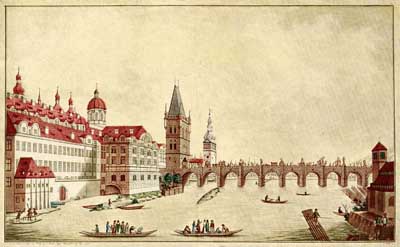
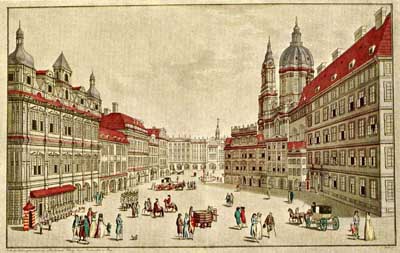
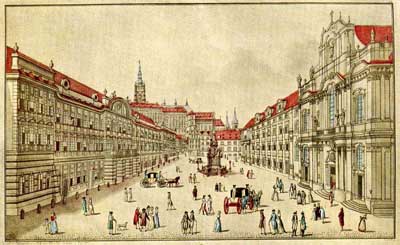
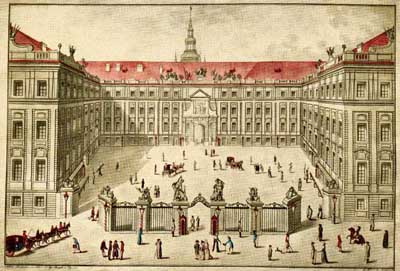
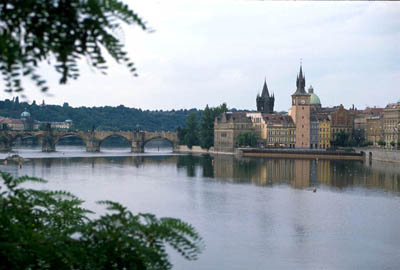
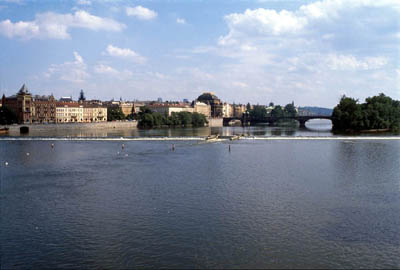
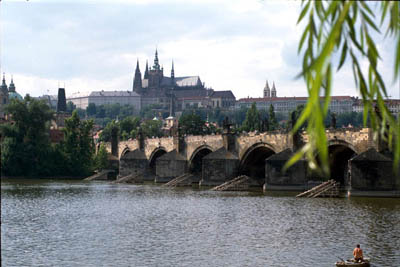
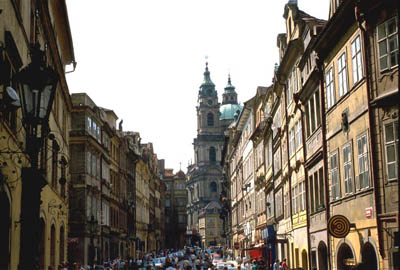
![]()
Berlioz’s six concerts in Prague were given either in the theatre or in Sophiensaal.
Located in the heart of Prague on Slovanský Island – Berlioz’s Island of Sophie – this palace was built in 1835-1837 in honour of Archduchess Sophie, Mother of Emperor Franz Joseph I. The hall, ideal for concerts and balls, became an important centre of cultural and social life, especially in the second half of the 19th century. Apart from Berlioz, Liszt, Wagner, Smetana and Dvorák were among the composers who performed here. The palace was rebuilt to its present form by the architect Jindřich Fialka in 1885-7; it now serves commercial functions.
Built by Count Nostitz Rieneck, the theatre was officially opened on 21 April 1783 with a first performance of Emilia Galotti by Lessing. Dubbed Count Nostitz’s Theatre in the first few years of its existence, its name has changed several times through the years: the Royal Theatre of the Estates, the Royal Provincial German Theatre, Estates Theatre (again), the Tyl Theatre; finally, after eight years of reconstruction, it regained its historic name Estates Theatre in 1990.
The building is located close to Wenceslas Square in the Old Town. The first performance of Mozart’s Don Giovanni took place there on October 29, 1787 as did that of La Clemenza di Tito in 1791. Apart from Berlioz, Weber, Paganini and Mahler are among those who have conducted or performed in this theatre.
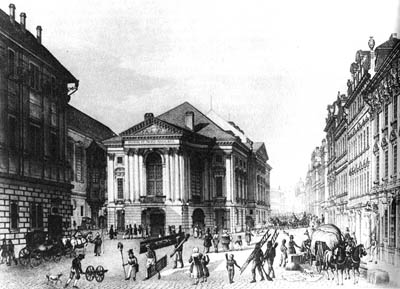
The above drawing by Vincenz Marstadt is courtesy of The New Grove Dictionary, volume 15 (1980), p. 196.![]()
![]()
The Hector Berlioz Website was created by Monir Tayeb and Michel Austin on 18 July 1997.
The Berlioz in Prague page was created on 16 May 2007. Revised on 1 April 2024.
© (unless otherwise stated) Michel Austin and Monir Tayeb